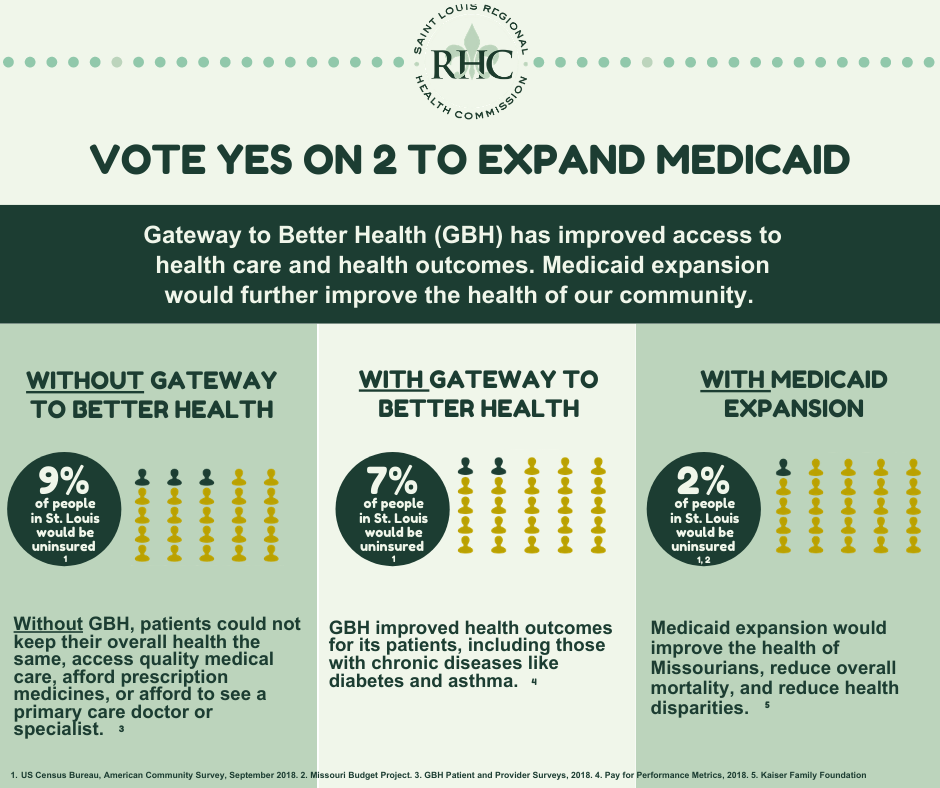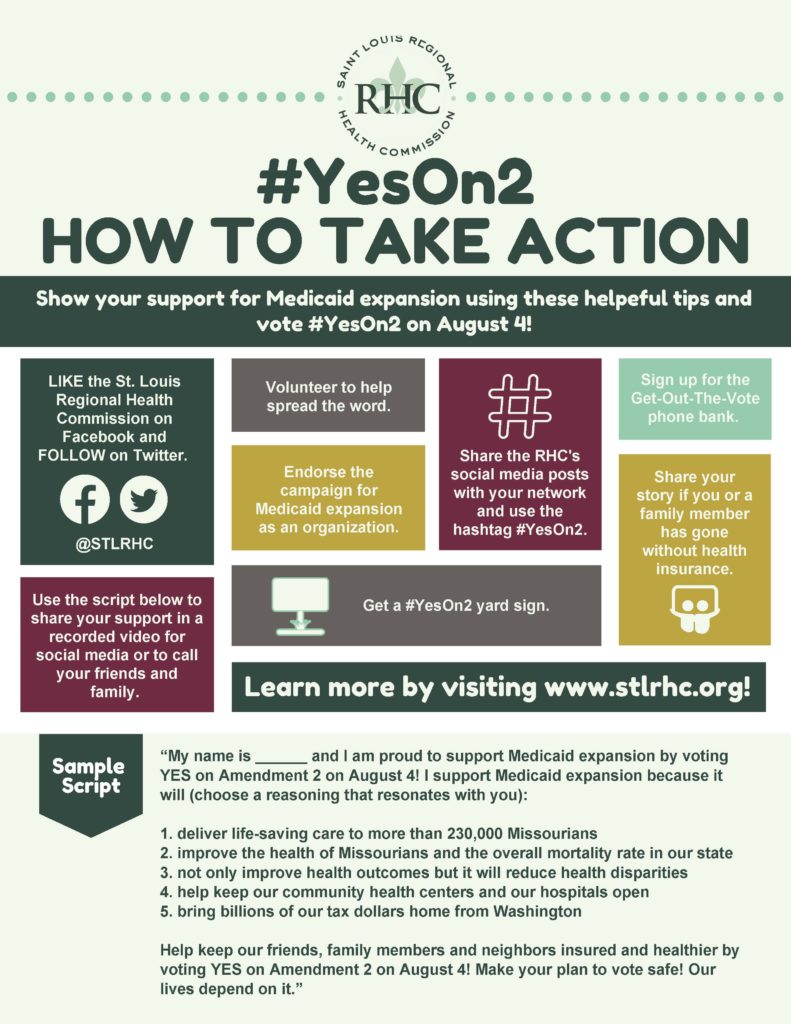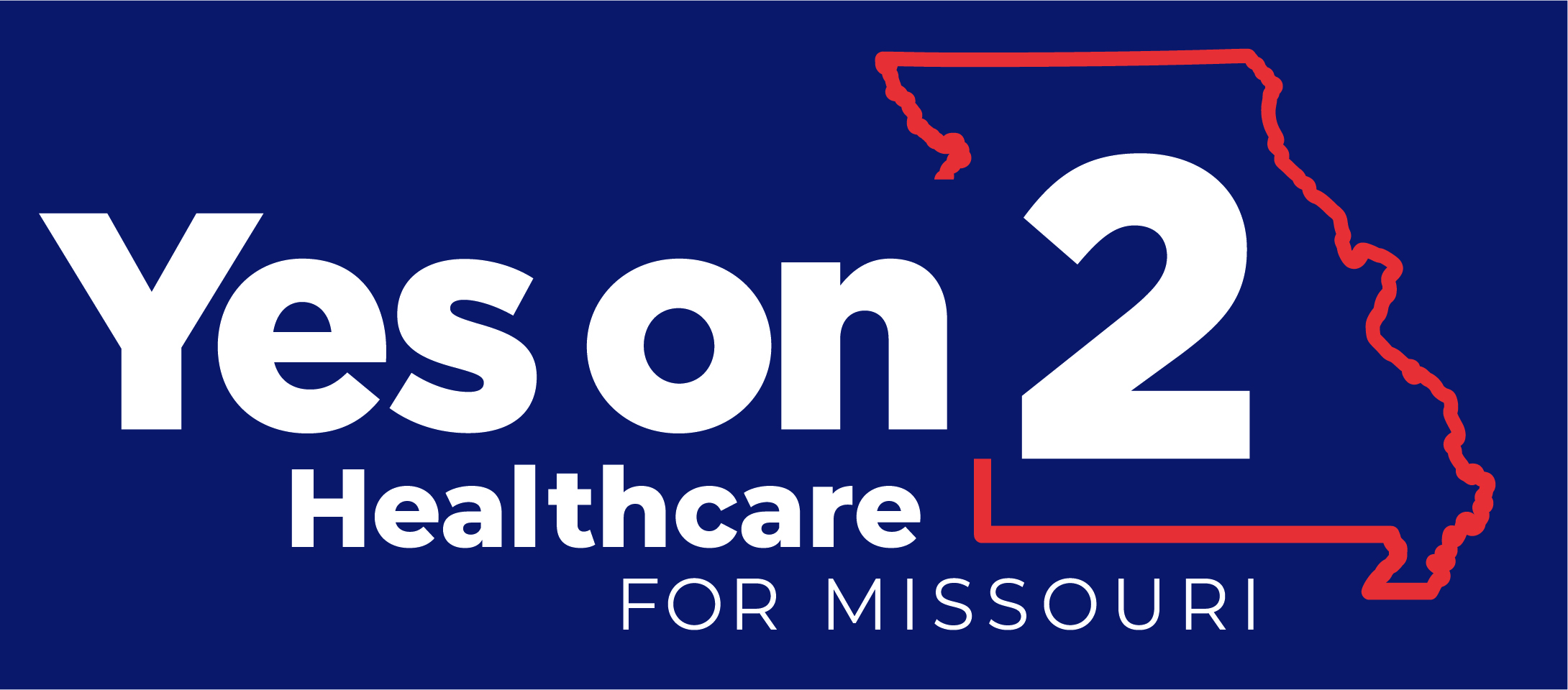Gateway to Better Health (GBH) is a lifeline. With GBH, uninsured individuals who struggle to afford medical care, gain access to quality health care services. Over the last eight years, GBH has covered 288,500 primary care and dental visits, 1.3 million medications, and 316,800 diagnostic tests and other procedures. The program has provided 63,779 otherwise uninsured people in St. Louis with health care coverage.
GBH has demonstrated that additional coverage improves the health of our community. Through meticulous data collecting and reporting, the pilot program has shown that coverage improves both access to health care and health outcomes for our region. Now is our chance to amplify these positive results of GBH across Missouri by expanding Medicaid.
Medicaid expansion would magnify the positive impact of GBH in four principle ways:
Increase access to health care
Both patients and providers report on the critical role GBH plays in securing quality care for participants. GBH patient and provider surveys show that members could not keep their overall health the same, access quality medical care, afford prescription medicines, or afford to see a primary care doctor or specialist without the program. [1]
One GBH member shared, “I had cancer last year, and Gateway came through for me all the way up to my one year follow up. I am very grateful.”
Medicaid expansion would provide even greater access to health care for Missourians, giving more benefits to more people. Expansion would provide health care coverage to more than 230,000 Missourians, including people with chronic diseases, such as diabetes and asthma.[2] Currently, almost 100,000 people are uninsured in the St. Louis region, meaning 1 in 10 do not have health coverage.[3] While Gateway provides critical coverage for our region, the rate of uninsured would plummet with Medicaid expansion, as shown in the image below.
Improve health outcomes
GBH improved health outcomes for its patients with chronic diseases. For example, since the start of the program, GBH patients with diabetes saw a significant reduction in HgbA1c levels (signifying improved control of the disease). [4] Additionally, almost all GBH doctors and patients report improvements in health of GBH patients since enrolling in the program.7
One GBH patient poignantly explained the importance of her coverage: “To me, not having health care means not having high blood pressure medication, which means a stroke.”
Medicaid expansion could further improve health outcomes across Missouri and reduce overall mortality.[5] The nation would have had 15,600 fewer deaths if all states had expanded Medicaid from the start.[6]

Reduce health disparities
One of the core objectives of GBH is to reduce health disparities in our region. The majority of GBH patients, who would otherwise not have access to the same level of quality health care, identify as African American.
Medicaid expansion would provide an additional 36,000 African Americans with health care coverage. [7] Expansion would also reduce disparities in health outcomes. For example, expansion is associated with a significant reduction in disparities for rates of preterm birth (a predictor of infant mortality) for black infants compared with white infants. [8]
Angela Brown, RHC’s Chief Executive Officer, explains: “As our nation battles structural racism, Medicaid expansion is one clear strategy to create a more equitable system of care.”
Helps keep community health centers and hospitals open
GBH has supported our community health centers (CHCs) and urban hospitals serve the most vulnerable populations in our region. Missourians rely on CHCs for critical services, such as medical, dental and behavioral health care, but these organizations are struggling to stay open with the current reimbursement rates. At St. Louis CHCs, 1 in 3 patients are uninsured, which financially strains the organizations. [9]
A GBH provider at one CHC stated, “We need Medicaid expansion. Gateway is a band aid on a water main explosion.”
Additionally, since 2014, 15 hospitals in Missouri have closed due to financial hardship, forcing people to drive longer distances to reach a hospital when experiencing a medical emergency.[10]
Medicaid expansion would help keep CHCs and hospitals open by providing even greater coverage than GBH, including reimbursement for services such as inpatient hospitalization, additional prescription medications, emergency room visits, and more robust dental services. Medicaid expansion would protect access to health care across our state, including the St. Louis region.
How can you help pass Medicaid expansion in Missouri?
VOTE YES ON 2 in the August 4th election and help us spread the word! Check out the infographic below with ideas on how to get involved.

[1] Gateway to Better Health 2019 Patient and Provider Satisfaction Surveys
[2] Kaiser Family Foundation – The coverage gap: uninsured poor adults in states that do not expand Medicaid
[3] Access to Care 2019 Data Book
[4] Gateway to Better Health Pay for Performance Metrics (community health center electronic medical records)
[5] Kaiser Family Foundation – The effects of Medicaid expansion under the ACA: updated findings from a literature review
[6] The National Bureau of Economic Research – Medicaid and mortality: new evidence from linked survey and administrative data
[7] Healthcare for Missouri
[8] Kaiser Family Foundation – The effects of Medicaid expansion under the ACA: updated findings from a literature review
[9] Access to Care 2019 Data Book
[10] Missouri Health Association – Missouri Hospital Closures

